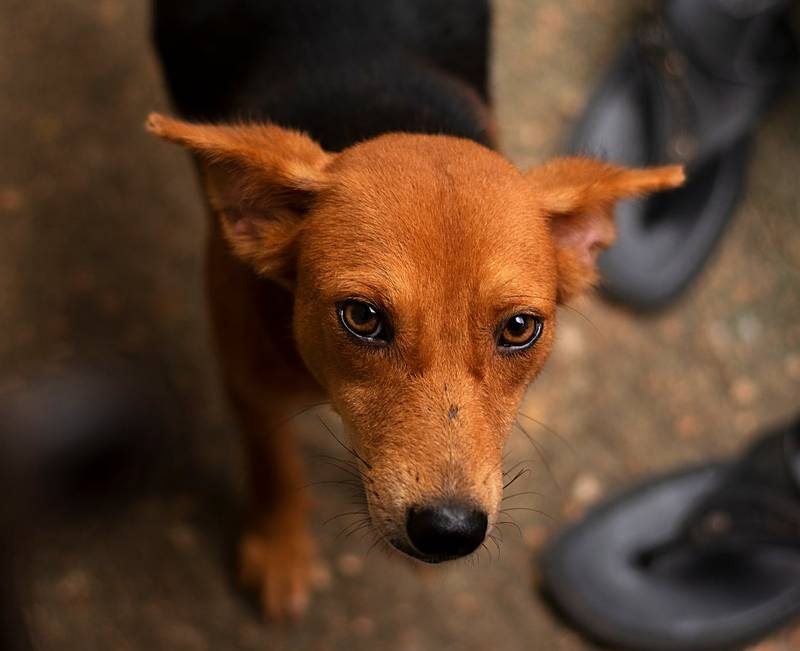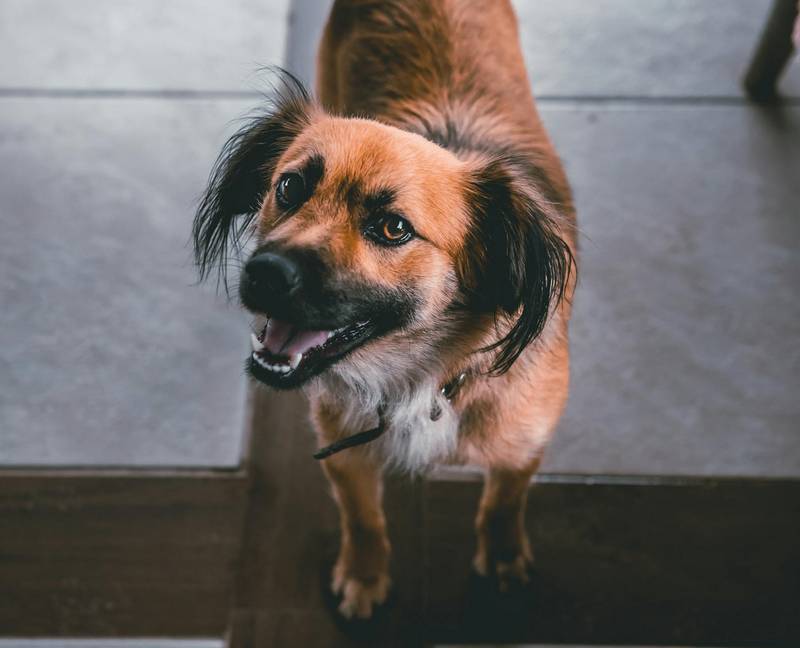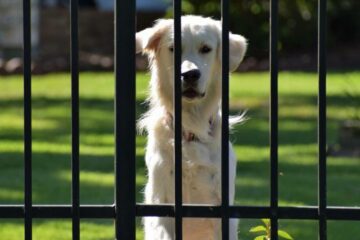Why Does My Dog Growl at Me for No Reason? (+How to Help!)
“Why does my dog growl at me for no reason??” It’s confusing, scary, and disheartening… but don’t worry! In this article, we’re going to explain why your dog is growling at you for no reason, the signs a dog will bite, how to calm a dog growling at you, and most importantly how to treat the true cause of the problem at its root.
To make sure we cover every bit of this topic, we’re also going to teach you the special considerations you’ll need to make if you have a puppy growling at you for no reason, or if your dog is growling at you at night only. Let’s get started on everything below!
Why Does My Dog Growl at Me for No Reason?

If your dog growls at you for no reason, it can be both confusing and concerning. Understanding the underlying causes of this behavior is crucial for addressing it effectively. Growling is a form of communication for dogs, and it’s rarely without reason. It could be a sign of fear, discomfort, or a response to something in their environment that you might not immediately recognize.
Why Is My Dog Growling at Me for No Reason?
Your dog growling at you for no reason (seemingly) often indicates an underlying issue that might not be immediately obvious. To understand the cause, watch your dog’s body language and the environment during these episodes.
Factors like anxiety, fear triggered by lights and shadows, discomfort from a medical condition, or even possessiveness over toys or food can lead to this behavior. Look for signs of stress or fear, such as a tucked tail, lowered head, flattened ears, or avoidance behaviors.
If the growling occurs in specific situations, like during meal times or when handling their toys, it could point to resource guarding. Environmental triggers, like sudden loud noises or unfamiliar people, can also cause fear-based growling.
Identifying the specific context and your dog’s body language cues is important for determining the root cause and addressing it effectively.
Signs a Dog Will Bite
The signs a dog will bite often include more overt body language than just growling. These can include baring teeth, a stiff posture, a focused stare, or ears pinned back. It’s important to recognize these warning signs and not to push the dog further into a state of discomfort or threat.
How to Calm a Dog Growling at You
To calm a dog growling at you, it’s important to stay calm yourself and not to punish the dog for growling. Instead, try to identify and remove the source of their discomfort if possible:
- Give the dog space and avoid approaching them further. Respect their need for distance.
- Use a calm and soothing voice to talk to them. Avoid making direct eye contact, as dogs can perceive this as a challenge.
- Train your dog with a ‘settle’ command. Start in a distraction-free environment. Use a calm voice and a hand signal (like a flat hand facing down) to instruct them to ‘settle’ or ‘relax.’ Guide them to a lying down position if needed and reward them when they comply.
- When they respond positively, reward them with treats and praise to reinforce calm behavior. Practice regularly, gradually introducing distractions as your dog becomes more proficient at the command.
In summary, if your dog growls at you for no reason (seemingly), it’s a sign that something is wrong, and it’s important to approach the situation with understanding and caution. Identifying the cause of the growling, recognizing signs of potential aggression, and using calm training methods can help manage and resolve this behavior.
Remember, though, that any of the underlying behavioral issues (fear issues, anxiety, resource guarding, etc.) that were causing all of this to begin with will still be present. And until you address those, any positive changes you see will only be temporary.
“Well, how do I make these changes last?”
By getting your dog to truly choose to follow your direction, that’s how. I tried many times to write out how you can do that before deciding it made more sense to just link you to the free video series that explains it better than I’d ever be able to.
The series is by a man named Dan who is one of the world’s leading dog obedience trainers. In it, he teaches you how to put an end to things like your dog growling at you for no reason and all other misbehavior using his fast and easy-to-follow methods.
In the first video, Dan will reveal to you why the two most common methods of dog training only doom you to failure. You can watch the video now by clicking here. Follow the proven system he’ll show you in his series and you’ll never have to spend another second worrying about your dog growling for no reason ever again!
Why Does My Puppy Growl at Me for No Reason?

If your puppy growls at you for no reason it can be very confusing, as their behavior is still developing and rapidly changing. Growling in puppies isn’t always a sign of aggression; it can be a part of normal puppy behavior, linked to playing, exploring, or expressing discomfort or fear.
Is My Puppy Aggressive or Playing?
To determine whether your puppy is being aggressive or just playing, observe their body language and the situation. Playful growling is common in puppies and often sounds less threatening than aggressive growling.
It’s usually accompanied by a relaxed or playful posture. On the other hand, growling and aggression at you may be accompanied by a stiff body, bared teeth, or a focused stare. Learn the four steps to calming a growling puppy by going back to the first section.
My Puppy Growls and Snaps at Me When Playing
If your puppy growls and snaps at you when playing, it’s often a part of their learning process. Puppies explore the world with their mouths and use play to test boundaries. Sometimes, this can mean that a puppy bites when excited.
However, it’s important to teach them gentle play. If the growling and snapping become too intense, it’s a signal to stop the play and give them a moment to calm down.
Puppy Growls and Bites When Picked Up
If your puppy growls and bites when picked up, they might be expressing discomfort or fear. Some puppies do not like being held or may feel insecure when lifted. It’s crucial to handle your puppy gently and to acclimate them to being picked up gradually. Use positive reinforcement to create a positive association with being held.
In summary, understanding why your puppy growls at you requires observation and knowledge of puppy behaviors. Growling during play is typically normal, but it’s important to teach your puppy appropriate play behavior.
If growling occurs in other contexts, such as when being picked up, it may be a sign of discomfort or fear. Responding with patience, gentle handling, and positive reinforcement can help your puppy feel secure and learn acceptable behaviors.
Why Does My Dog Growl at Me at Night?

Your dog growling at you at night might seem puzzling and can be due to various reasons. It could be a response to external stimuli that you’re not aware of, discomfort, or even issues related to anxiety or fear. Understanding the root cause of this behavior is essential for addressing it effectively and ensuring a peaceful environment for both you and your dog.
Dog Growling at Night: How to Help
If your dog is growling at night, it’s important to assess both their physical comfort and mental state. Check their bedding for any signs of discomfort, such as lumps or cold spots, and consider the room temperature and noise levels.
Also, think about any recent changes in the household that might be unsettling and causing your dog’s night aggression, like a new pet or a change in routine. Offering a consistent and calm bedtime routine, including a quiet time before bed, can also be beneficial in soothing nighttime anxieties.
Many dogs also like relaxing music like you can find in the video below:
My Dog Growls at Something I Can’t See
If your dog growls at something you can’t see, they might be detecting something outside or even inside the house that’s not apparent to you. Dogs have a more sensitive sense of hearing and smell, so they could be alert to wildlife outside, unfamiliar scents, or subtle household noises.
Try to provide reassurance to your dog in these moments. You can also look into ways to minimize external noise or distractions, such as using white noise machines or closing curtains. The “settle” command can also help relax your dog. Learn it now in the first section.
Dog Growling at Night in Bed
If your dog is growling at night in bed, consider if the growling is a sign of possessiveness over their sleeping area or a reaction to being disturbed while sleeping. Some dogs may become territorial of their bed or even experience discomfort if disturbed during deep sleep.
Assess if the bed itself is suitable for your dog, offering adequate support and space. In cases of territorial behavior, it may be beneficial to work on obedience training to reinforce your role as the pack leader and establish boundaries.
In summary, if your dog growls at you at night, you must understand the cause, which could range from environmental factors to health issues. Ensuring a comfortable sleeping space, considering any external stimuli, and providing a consistent routine can help address nighttime growling.
I’m sure you’re ready to begin now that you have all of your questions about your dog growling for no reason answered, so I’ll let you get going on things. Good luck, and thanks for taking a look at our article “Why Does My Dog Growl at Me for No Reason? (+How to Help!)”.





